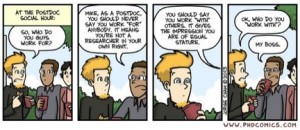by Juliane
As a postdoc it is sometimes hard to maintain enthusiasm. When I started in science I was super-enthusiastic, everything was new and interesting and I learned fascinating stuff every day. I sometimes wish I was still like that. Over time I noticed that there is another side of lab work: failed experiments, hours of incubations, tons of paperwork. This is balanced by the little successes: a cloning step that finally worked, a stable cell line that stays stable, a band on a gel at just the right size. Those little successes help me to reach the bright spots: the exciting results, when cells behave in unexpected yet fascinating ways, when analysis of the mass spec results in exactly the one protein predicted by your pet theory, when everything falls into place and finally makes sense.
As a postdoc such bright spots become less frequent. This is not the postdoc’s fault; this is how it is supposed to be. PhD projects are designed to yield results in time for a thesis. Committees, supervisors and mentors make sure that the projects aren’t too risky or too long. So who therefore is going to undertake the risky, long projects? Postdocs! New postdocs will often get risky projects, including ones that the PI has been sitting on for some time, or projects other people have failed at (often more than one other person). This can lead to fewer positive moments for the postdoc and instead, longer stretches of frustration interspersed with small successes which become less and less valuable over time. Unfortunately this is normal too, the first time I got a positive clone after a ligation was amazing, the 10th time was nice, but after my 63rd successful plasmid, this is no longer a big deal. It is hard to keep up enthusiasm when you only progress in tiny increments and the big goal is so far away that you can’t even see it yet.
One strategy that works for me is to make the project mine. I found the best way to make a project mine is by talking about it a lot, discussing it with potential collaborators and defending it to colleagues in talks and poster presentations. However postdocs often have few possibilities to present. The reason for this is related to the long and risky projects often undertaken by postdocs. Such research will typically not quickly lead to results that can be presented at conferences. In addition conferences are increasingly expensive. To just go and present a poster that doesn’t add much data to the existing scientific knowledge might not be a cause the PI is willing to spend money on. There are few travel grants available to postdocs and we don’t earn enough to pay for such trip ourselves. At home, postdocs, especially early ones, are seldom invited to speak at department seminars or present their work to other groups in a similar field. The best solution might be to take every opportunity to talk about research, even if it is a chalk talk for 1st year PhD students.
But even if the project works brilliantly and the PI sends you to international conferences and is generally supportive of your career, other things can interfere with enthusiasm for work. We are getting older. Graduate students can readily put their life on hold for 3-5 years, but postdocs have already gone through this. Now other things get important; we might want to take our relationships to the next level: get a mortgage, get married, maybe have children. All those life projects need enthusiasm, enthusiasm that is taken away from work-related enthusiasm. However, this is not a bad thing, very few people can just work and not live and the few that do, end up lonely and burned-out having a heart attack in their 40s. It is important, but difficult to find a good work life balance and neither aspect should take too much strength and enthusiasm away from the other one. Despite this, we should always remember why we have followed this path in life. Working in science, discovering fundamental things about the world around us can be a fascinating and at times fun life, which can and should inspire enthusiasm in other aspects of life. All we can to is keep up enthusiasm for our work and make the little lights shine brighter.
 At some point another enthusiasm killer rises its head (or so I have heard) is the “why am I doing this for this guy, who doesn’t appreciate me” enthusiasm killer. When you have learned everything you can from your PI, write all your own papers and the ones for the PhD students as well (with minor corrections by the PI), basically wrote the last grant even though it is still their name on the grant, he/she is corresponding author and you only get a pat on the back, then it is hard to keep up the enthusiasm, spread cheerfulness in the lab and keep everything afloat. However, this lack of enthusiasm is a good thing: it means that the postdoc is finally ready to move on to new horizons and challenges.
At some point another enthusiasm killer rises its head (or so I have heard) is the “why am I doing this for this guy, who doesn’t appreciate me” enthusiasm killer. When you have learned everything you can from your PI, write all your own papers and the ones for the PhD students as well (with minor corrections by the PI), basically wrote the last grant even though it is still their name on the grant, he/she is corresponding author and you only get a pat on the back, then it is hard to keep up the enthusiasm, spread cheerfulness in the lab and keep everything afloat. However, this lack of enthusiasm is a good thing: it means that the postdoc is finally ready to move on to new horizons and challenges.